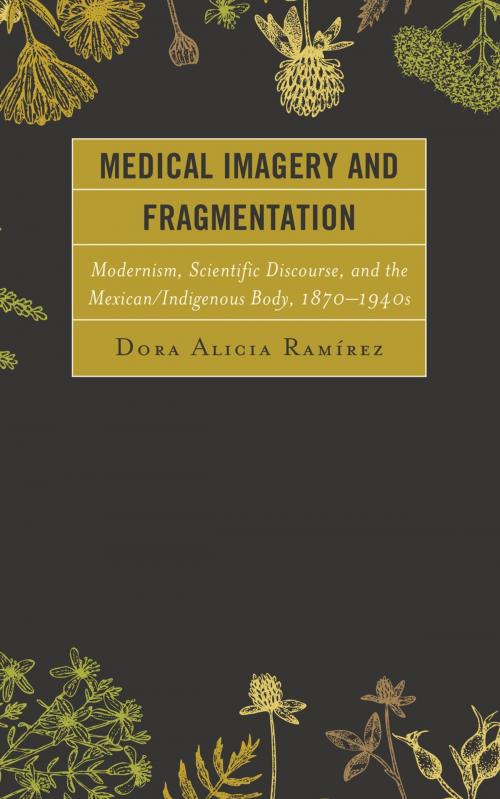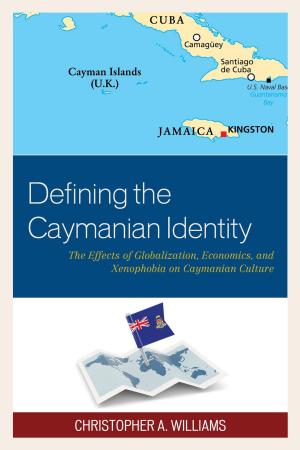Medical Imagery and Fragmentation
Modernism, Scientific Discourse, and the Mexican/Indigenous Body, 1870–1940s
Fiction & Literature, Literary Theory & Criticism, Women Authors, American| Author: | Dora Alicia Ramírez | ISBN: | 9780739198292 |
| Publisher: | Lexington Books | Publication: | July 19, 2017 |
| Imprint: | Lexington Books | Language: | English |
| Author: | Dora Alicia Ramírez |
| ISBN: | 9780739198292 |
| Publisher: | Lexington Books |
| Publication: | July 19, 2017 |
| Imprint: | Lexington Books |
| Language: | English |
This Book marks a time period (1870s-1940s) when Mexican authors writing in English saw themselves as transnational authors whose role was to teach the English speaking public about Mexico. This book takes a look at four inspiring women whose ideas represent the way medicine and science permeated the personal lives of Mexican and Indigenous peoples whose lifestyles did not happen to meet the requirements of an industrialized or modern citizenry. These women include historical figures such as the folkloric healer, Teresa Urrea (1873-1906), and authors, Maria Amparo Ruiz de Burton (1872), Maria Cristina Mena (1914), and Josefina Niggli (1947). These women writers focused on the modernist construction of the body and brought in aspects of how the soul (through racial, gendered, national, political, and socio-economic lenses) was reconstructed as a way to manage the health and space of the Mexican/Indigenous populations in order to move into an era of industrialism and positivism. By focusing on how industrialism led to the negation of racialized bodies, knowledges, and spaces, this book takes a deeper look at the concept of the “individual” as a medical, economic, political, and theoretical term, focusing on the way medical knowledge, the doctor, surgery, experimentation, healing, and specifically, the soul, is treated in Latina modernist literature. This book adds to the modernist discussions of literary figures such as Bernard Shaw, T.S. Eliot, D.H. Lawrence, William Carlos Williams, Frida Kahlo, Ezra Pound, and Gertrude Stein. Urrea, Ruiz de Burton, Mena, and Niggli continue the critique of a burgeoning medical system and rhetoric, and they add the Mexican/Indigenous viewpoint and transnational perspective that is important to any dialogue.
This Book marks a time period (1870s-1940s) when Mexican authors writing in English saw themselves as transnational authors whose role was to teach the English speaking public about Mexico. This book takes a look at four inspiring women whose ideas represent the way medicine and science permeated the personal lives of Mexican and Indigenous peoples whose lifestyles did not happen to meet the requirements of an industrialized or modern citizenry. These women include historical figures such as the folkloric healer, Teresa Urrea (1873-1906), and authors, Maria Amparo Ruiz de Burton (1872), Maria Cristina Mena (1914), and Josefina Niggli (1947). These women writers focused on the modernist construction of the body and brought in aspects of how the soul (through racial, gendered, national, political, and socio-economic lenses) was reconstructed as a way to manage the health and space of the Mexican/Indigenous populations in order to move into an era of industrialism and positivism. By focusing on how industrialism led to the negation of racialized bodies, knowledges, and spaces, this book takes a deeper look at the concept of the “individual” as a medical, economic, political, and theoretical term, focusing on the way medical knowledge, the doctor, surgery, experimentation, healing, and specifically, the soul, is treated in Latina modernist literature. This book adds to the modernist discussions of literary figures such as Bernard Shaw, T.S. Eliot, D.H. Lawrence, William Carlos Williams, Frida Kahlo, Ezra Pound, and Gertrude Stein. Urrea, Ruiz de Burton, Mena, and Niggli continue the critique of a burgeoning medical system and rhetoric, and they add the Mexican/Indigenous viewpoint and transnational perspective that is important to any dialogue.















